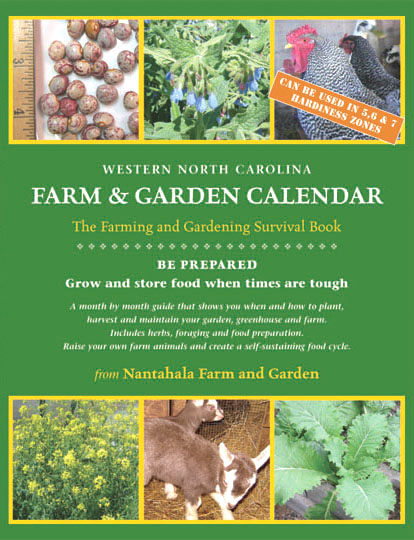Western
North Carolina
Farm & Garden Book
280 page book. 8 ½" x 11", $25.
Western North Carolina
Farm and Garden Book
by Nancy Shirley
A month by month guide when / how to plant, harvest and maintain your garden,
greenhouse and farm. The best time to plant.
The focus is on old-time ways of living, natural and organic. There is a
tremendous amount of valuable information in this book.
$25 + $3.99
shipping.
|  |
Covers
All Aspects of Farming
Includes farm animals, foraging, food storage, and food preparation. Plus
garden tips, folklore, seed saving, seed starting, herbs, plant families,
and plant health. How to farm the old-fashioned way, natural and organic.
The book has an index by common plant name, an index by plant type such
as root crop, and a general index.
Part One: Month to Month Guidance
Each month explains what you need to do to stay on top of your food production
plan. At the beginning of every month the Calendar lists an overview of
what needs to be done.
Every plant includes its botanical name along with common names. After each
description of a plant or animal, there are recommended books to read and
where else in the Calendar that plant or animal is mentioned.
|
 |
Garden-Maintenance
Then there is a section each month on Garden-Maintenance. How to maintain
your plants and animals so they stay in the best condition.
For instance, in February you need to prune your fruit and nut trees. It
goes into detail about how to properly prune each type of tree.
In September Garden-Maintenance you are reminded to cut off the flowers
and small fruit that will not ripen before frost so all energy goes to the
remaining flowers and fruit.
Garden-Plant
Each month has a section for planting.
For instance, in March Garden-Plant discover ideas for predicting frost
and reducing frost damage. Then learn what cool weather cover crops and
grains need to be planted such as clover, fava beans, fescue, flax and oats.
See how to sow and care for them properly.
In September Garden-Plant find out what (and how) should be planted such
as garlic and perennial onions for harvest next year. Hairy vetch, annual
ryegrass, winter wheat, winter radish and radicchio are good to plant this
time of year.
|
 |
Garden-Harvest
Each month has a harvest section.
For instance, in the Garden-Harvest section of May it gives details about
making hay without large machinery (no gas/diesel), how to harvest grain
by hand or with small manual tools, how to test/dry/store grain. Learn how
to thresh, winnow and dehull grain. Find out how to test for the correct
moisture content of grain before storing it.
Study drawings of different types of solar food dryers. Most people don't
know these skills but you need to know them to be self sufficient. Plus
there are drawings and photos of this equipment and how to use them.
There is a lot of emphasis on the right time to harvest and how to store
food that you grow.
In September Garden-Harvest see what is involved in foraging and preparing
hazelnuts, hickory nuts, acorns and walnuts including differences among
varieties. See how the old-timers cracked, mashed, cooked, dried and stored
them.
In October Garden-Harvest see which plants to harvest before frost, after
light frost, after hard frost, or anytime throughout winter. And how to
store them after you pick or dig them including root cellars and clamps.
|
 |
Greenhouse, Hoop House or Cold Frame
Every month has a section on Greenhouse, Hoop House or Cold Frame.
For instance, in March Greenhouse learn how to start seedlings and sprouts
for arnica (medicinal herb), asparagus, broccoli, broccoli raab, cabbage,
celery, chrysanthemum, ground cherry, kohlrabi, pepper, sweet potato, tomato,
and tomatillo.
Also details on how to pre-sprout white/red/purple potatoes for greater
productivity when you plant them later.
In September Greenhouse find out which plants to sow such as arugula, claytonia,
endive/escarole, mache, mizuna, minutina, mustard, pak choi, parsley, scallion,
swiss chard, tatsoi, and turnip.
Some of these can tolerate temperatures down to 0 degrees and still keep
living.
|
 |
Farm Animals
Every month has something you need to do for your animals.
Included are all the basic farm animals such as bees, cats, cattle, chickens,
dogs, ducks, goats, homing pigeons, horses, pigs, rabbits, sheep and turkey.
For instance, in February Farm Animals read about the common dairy/meat/fiber
goat breeds, how to care for goats, and how to milk a goat. Get information
on clabbering milk (fermenting) so it stores longer and is better for you.
In April Farm Animals get details about how to set up nesting areas for
broody hens. How to break up a broody hen. Also formulas for worming animals
with herbs and other natural methods.
Part Two: How To Guides
Four Guides and a 3-part index.
The Guides include: Garden Tips, How to Save Seed, Plant Families, and Plant
Health.
One index is alphabetical by plant name.
The second index is by how plants are used.
The third index is a general index of all farm/garden topics.
|
 |
 |
|
280
page book. $25.
To order, pay with Paypal.
There's no book like this one.

|
|
 |
PART
TWO:
How To Guides
Garden Tips- General, Seeds/Seedlings, Soil/Crops, Propagation: 18
pages
How to Save Seeds- Pollination, Breeding, Harvesting, Saving: 5 pages
Plant Families- Care, Diseases, Pests and Seed Saving: 18 pages
Ways to Improve Plant Health- Diseases, Pests, Methods of Control:
20 pages
3 Types of Index- Alphabetical, By How Plants Used, General Index:
16 pages
|
 |
|








